
12 minute read
My career journey
My career journey… Respice Prospice
byWinston Middleton
Career Update (CU) was curious about the career journey of Winston Middleton, Manager of the Offi ce for Student Development, that spans four decades across three provinces and two countries.
HE WILL FINALLY BOW OUT OF UWC IN DECEMBER 2020. We trust that our readers will extract learnings from his story as you plan your career. Four employers and six posts – How did your journey start?
I enjoyed each work opportunity and took away so many learnings. After completing Matric in 1971 at Little Flower School, Ixopo, I registered for an Electrical Engineering degree at the then University of Natal (UN).
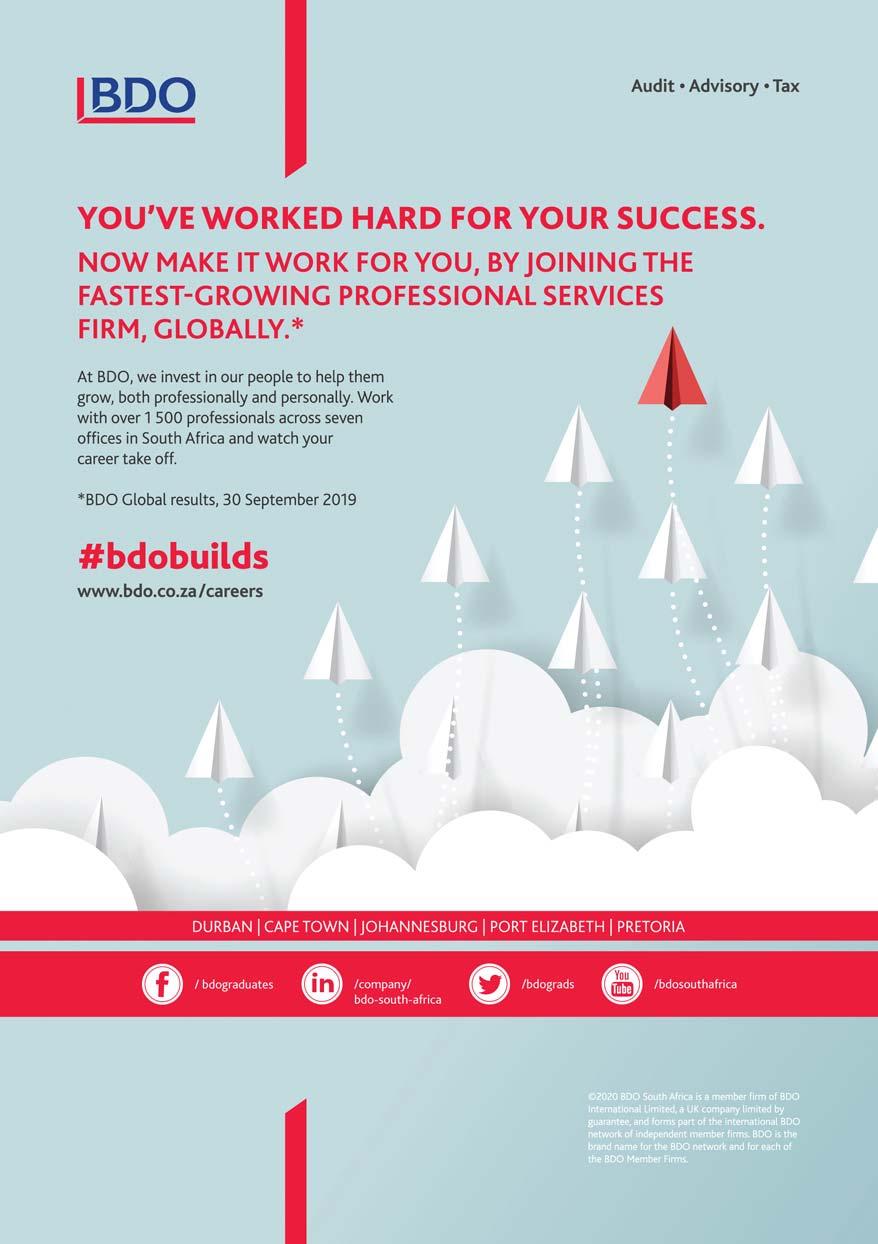
I battled with the unfamiliar subjects and subtle racism, and dropped out at the end of 1972. Thereafter, I had a short stint as a “bedding-boy” for the Railways.
After months of hunting, I was appointed in 1973 as an apprentice electrician by a large electrical cable-making company and qualifi ed in 1977. This trade was the last one reserved for White persons. All the electricians were White and most of them did not support my appointment. Also, I could not share the same toilet and tearoom, and had to wear a brown overall instead of the white one. My Dad told me after contemplating resigning after six months, “Stay to learn the trade and become a qualifi ed artisan.” After four years, I was the highest qualifi ed journeyman and my colleagues frowned upon my qualifi cations. Besides the technical knowledge, I learned to solve problems logically and deal with racism. These skills have been useful ever since.
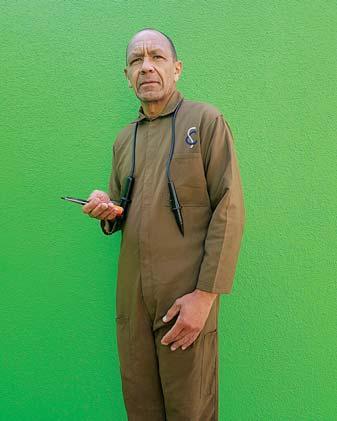
During those years, I became a community activist in Pietermaritzburg. Henry Isaacs, a student of UWC who was served with a banning order and restricted to Pietermaritzburg, coached and mentored me into Black Consciousness, and encouraged me in later years to pursue tertiary studies so that our activism could be informed by theory and not only by “trial and error”. In commemoration of June 16, 1976, our Church Youth arranged a commemoration event in June 1977 for the youth on a Friday evening. On that morning, the Security Branch (SB) offi cers of the Police served a prohibition order on me at work. The event was prohibited and nobody could enter the Church building until 10h00 on Sunday. Despite this, we went to the Church to be met by armed police. Our Minister, late Rev Peter Lamoela, arrived and persuaded us to disperse.
Describe your student days at UWC and how it infl uenced your career.
I enrolled at UWC in 1979 for the Social Work degree after being refused a study permit for the universities of Natal and DurbanWestville. However, I do not regret the Government’s decision.
During our fi rst year, a few of us started advocating for an SRC that was banned in 1977. Learner and student protests erupted during the Second Term of 1980 in Cape Town. The ‘Economic Disruption’ on the Saturday of shopping malls by learners and students, and the ‘Purple Rain’ demonstration will remain embedded in my mind. As part of the campus Student Action Committee, we were informed that pupils of a Primary School in Modderdam Road were raided and arrested by police after staging a
demonstration. We made our way to the Bellville Police Station to meet with parents and arrange for legal assistance. At that moment, I was arrested by a policeman and immediately served with a 14-day detention order of solitary confi nement and taken to the Parow Police Station. There I was interrogated regularly at 4h00 in the morning. The SBs wanted me to confess the names of student activists including Cecyl Esau and Ebrahim Patel. Of course, I refused their order. I busied myself in a 2x1m jail cell even following the ants. Among the graffi ti on the wall, it was uplifting to discover the following message, “Basil Kivedo was here”. He was my Sociology lecturer.
My Holy Bible and a jacket were sent by my Dad. I read it from cover to cover. I discovered a note in the seam of my jacket written by my Dad, “Be strong. We are with you.” I burst into tears of joy. I had so many hours to think about so much and distill past events on campus. To keep sane, one had to stay in touch with the day of the week and time of the day. I still get fl ashbacks on driving past that Police Station. After the 14 days, I was transferred to the Victor Verster Prison in Paarl where I was held for three months with comrades - learners, students, workers and UWC lecturers. After a successful hunger strike of over two weeks, we forced the prison authorities to provide
all detainees with the “White diet” and to release us seeing that we were not to be charged for any off ence. On a Saturday, we were released and driven back to Cape Town to be united with our families.
By then, the schools and UWC had resumed classes. I requested counselling from our Student Services. However, the White Psychologist was not knowledgeable about my (political) context and was not of much help. I dived into my studies as I lost three months of lectures and completed my degree in 1981, cum laude.
During our fi nal year, a group of students told the Social Work Department that we wanted to do our practical work at schools. After contacting a few Principals, we were placed there. This initiated the School Social Work model for our profession as we carefully documented and evaluated our interventions. At the end of the year, we invited the education authorities to a seminar to present our report and convinced them to create posts for social workers at schools. The rest is history.
You then moved to the Eastern Cape?
I knew where I did not want to work – government and private welfare organisations – and searched for community-based posts. After due process, I started working in 1982 as a social worker for the then Grahamstown Municipality and immediately pursued the Honours degree in Social Work at Rhodes University. Given my background and radical views about social work, I ran into problems with my employer during the fi rst six months. They wanted me to do only “casework” but I reminded them that I had clarifi ed this issue at the interview where I stated that I would
apply the “integrated approach” of casework, group work, community work and research. The consequence was that my probation period was extended. I proceeded to pioneer social services in local authorities in SA and later completed a Master’s degree on this topic. Today it is an established practice across the country. I was accepted for a year-long scholarship for Youth Leaders and Social Workers to Chicago, USA from the Council of International Programmes. I was exposed to American society but, in particular, the Afro-American community on the Southside. My world view expanded as I met people from across the world.
Winston Middleton meeting Mayor Washington (first black mayor of Chicago) joined by the CEO of the Abraham Lincoln Center, Mr Othello Ellis, in Chicago.
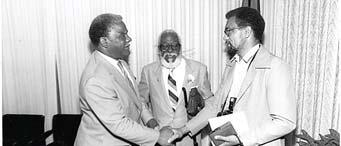
I returned in 1987 to my post. In 1988, I was recruited to the post of Faculty Offi cer at UWC for the newly established Community and Health Sciences under Dean, Prof Fanie Sonn. Later, I moved to Student Counselling in 1990 and then appointed in 2001 as the Head of the newly established Offi ce for Student Development where I retired in 2019 after 32 years of loyal service.
Again, you did pioneering work in this post.
Working with wonderful colleagues over the years, we built out four key programmes, namely, Careers Service, Student Orientation, Student Governance and Student Development. These became groundbreaking initiatives in higher education institutions with many universities benchmarking themselves against our programmes. We received several accolades for our dreamwork. We presented our Student Orientation Programme, initiated long before the “First Year Experience” paradigm became popular in SA, at many national and international conferences. Since 2013, our Careers Service featured consistently in the Top 7 for the “Best Careers Service” and the “Best Career Fair” categories of the national employer benchmark survey among leading recruiters in South Africa conducted by the South African Graduate Employers Association (SAGEA). This demonstrates that UWC remains an institution of choice for employers when searching for graduate talent. Our SRC elections have been declared credible, free and fair since 2003 when we started managing it and the SRC Constitution and Election Regulations were penned in our Offi ce.
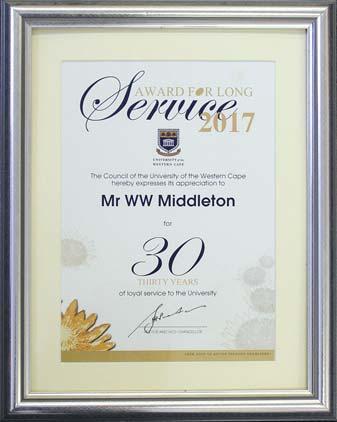


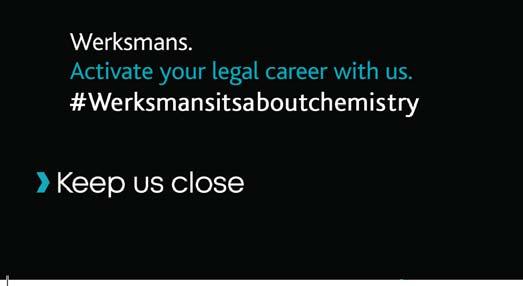
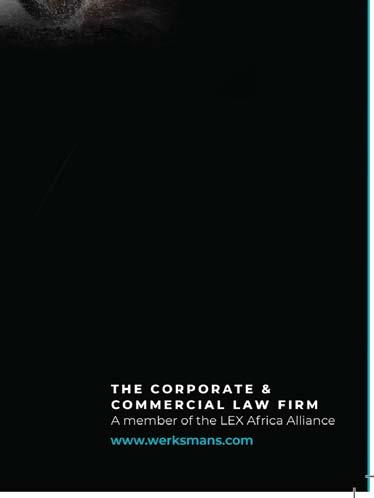
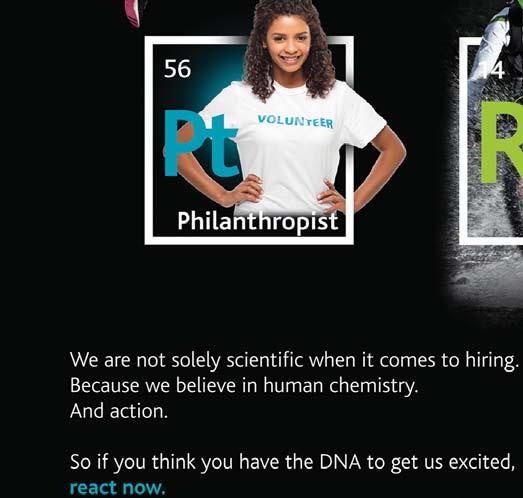
Who had an impact on your career and outlook on life?
It is a law of life that we become like the people we gaze at. Others state that we are known by the friends we keep. Besides my parents, others are the late Henry Isaacs and Mr Madiba Mandela, Prof Fanie Sonn, colleagues of the former UWC Centre for Student Counselling and Prof Brian O’Connell. Many others have touched my life in diff erent ways.
What shaped your interest in student development?
As a social worker, I have always been interested in community and youth development. Our youth are not the future leaders but also in the present. I do not want the leaders of tomorrow to point an accusing fi nger at me and say, “Where were you when…?” I am obligated to create a better future for us all.
What will you miss about UWC?
No two days are the same (before Covid-19) and things could change in a fl ash – and we have to be ready for it. The unique campus culture is entrenched and the environment is welcoming and dynamic. I have a strong emotional bond with UWC nurtured over 42 years of struggle, reconstruction and recalculating as a student, alumnus and staff er. I often ask myself, “How did UWC become a trail-blazer among historically disadvantaged institutions despite being in deep fi nancial debt at the turn of the century?” My reasoning points to “because of its people”. I often joke that my corpse should be draped in a UWC T-shirt. I wear our branded apparel with pride. I am sensitive to the burden of responsibility that we carry as staff members. What inspires you about our students and staff ?
Students are fi rmly anchored in why they are here, how they got here and what they want to achieve. Moreover, they are resilient and have consistently demonstrated that they are not defi ned by the labels placed on them and proceed to achieve despite the odds. The warmth of the staff is easily felt and their dedication is visible. If not, why is UWC a recruiting ground for other universities?
How do you manage stress?
I maintain a good work-life balance and have strong genes. I having been walking and running on the road for over 25 years having completed multiple races from 5 kms up to ultras. I started six Comrades Marathons (89kms) and completed two, and am not done yet. This form of exercise has helped me to destress and keep sane. Running keeps me grounded during tough times.
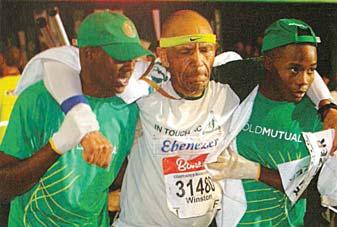
Winston Middleton at finish line of 2017 Comrades.
Share some thoughts about the job search and career
The economy is in distress and thus the competition for graduate posts is tough. Students should focus on getting their fi rst
job even if outside of their fi eld of study. After all, research shows that people change jobs more than fi ve times in their working life – I am a living example. Work hard and diligently wherever you are; keep your eye on the ball. You will be spotted by someone.
Do you have any regrets?
Yes, two. Firstly, I regret boycotting my fi rst UWC graduation. I stood by the majority decision of the 1981 student mass meeting to do so despite my voting against it. I was shocked to see students attending who supported the motion. My Mother never forgave me. With my Honours graduation at Rhodes University, she told me that she would attend even if I boycotted it – of course, I had no option. Since then, I realise that graduation is for our family and sponsors and that my decision, in retrospect, was selfi sh. I also regret not completing doctoral studies despite me having collected valuable data over the years about our fi rst-year students and their experience.
How would you like to be remembered?
Students have ascribed several descriptors to me:
• Disciplinarian, uncompromising, a stickler for rules and a hard taskmaster. • Also, understanding, caring, fair and approachable.
My response is always, “Give it some time and you be the judge.” I believe, as a former referee of junior soccer, that once the whistle is blown to start the match, then all players implicitly accept the rules of play till the end. It sounds a bit ‘old school’ but it has worked well for me. I also tell students about myself that “what they see is what they will get”. I believe in providing the best for our students, UWC, South Africa and even Africa. The accolades received by the Offi ce for Student Development are testimony to our commitment.
My critical writing skills coupled with attention to detail, task-orientation, integrity and ability to take a drone (helicopter) view of a situation have stood the test of time. I have not been afraid to speak ‘truth to power’ and am open to uncomfortable conversations. I do not allow personalities to obstruct strategy and goals.
Share your parting strokes?
• Be mindful and sensitive about the opinions of team members. • Be careful how you live; you are the only religious book some students read. • First impressions are lasting. • Do not leave room for deceitfulness, shameful deeds or doubtful behaviour.
The commitment of our OSD Team to building UWC into a place of quality and a place to grow for our students, staff and communities remains unshaken. Until each person in our beloved country can live in dignity, the education project of UWC will remain ‘work in progress’. I have tried to live a life above reproach but realise that I might have disappointed some. If so, I ask your forgiveness. Praise be to God for the opportunities presented to me and for guiding me along this journey. CU










